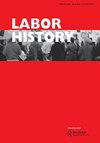“怕数字?”"德意志帝国的劳工运动和社会调查
IF 0.7
4区 管理学
Q1 HISTORY
引用次数: 0
摘要
历史学家长期以来一直在研究统计部门和议会机构如何利用调查来探索工人的生活,以及在此过程中,他们如何产生新的社会类别和政治干预策略。很少有人注意到调查在早期劳工运动的历史中所起的作用。借鉴社会主义和工会期刊上的广泛讨论,本文探讨了德意志帝国的工人运动如何感知、回应和使用社会调查。本文分为三个部分。第一部分讨论了工党对中产阶级改革者、社会研究人员和国家对工人阶级生活的越来越多的调查的批判性回应。第二部分研究了他们批判的唯一逻辑结果,即对数据的独立收集和分析。第三部分最后分析了为什么尽管中共官员和地方工会开展了大量独立调查,普通工人的参与率仍然低得惊人。在结论中,文章表明,这可能不仅源于不感兴趣和惰性,还源于工党领导层如何构思和呈现社会调查的好处。本文章由计算机程序翻译,如有差异,请以英文原文为准。
“A phobia of numbers?” the labour movement and social surveys in the German Empire
ABSTRACT Historians have long studied how statistical offices and parliamentary bodies made use of surveys to explore the lives of workers, and, in so doing, how they produced new social categories and strategies for political intervention in the process. Less attention has been paid to the role that surveys played in the history of the early labour movement. Drawing on extensive discussions in socialist and trade-union periodicals, this article explores how the labour movement in the German Empire perceived, responded to, and used social surveys. The article is divided into three parts. The first part discusses labour’s critical response to the growing number of surveys on working-class life by middle-class reformers, social researchers, and the state. The second part studies what appeared to be the only logical consequence of their critique, namely the independent gathering and analysis of data. The third part finally analyses why, despite the large number of independent surveys launched by party functionaries and local trade unions, participation among ordinary workers remained strikingly low. In the conclusion, the article shows that this might have stemmed not only from disinterest and inertia but also from how the labour leadership conceived of and presented the benefits of social surveys.
求助全文
通过发布文献求助,成功后即可免费获取论文全文。
去求助
来源期刊

Labor History
Multiple-
CiteScore
1.00
自引率
28.60%
发文量
44
期刊介绍:
Labor History is the pre-eminent journal for historical scholarship on labor. It is thoroughly ecumenical in its approach and showcases the work of labor historians, industrial relations scholars, labor economists, political scientists, sociologists, social movement theorists, business scholars and all others who write about labor issues. Labor History is also committed to geographical and chronological breadth. It publishes work on labor in the US and all other areas of the world. It is concerned with questions of labor in every time period, from the eighteenth century to contemporary events. Labor History provides a forum for all labor scholars, thus helping to bind together a large but fragmented area of study. By embracing all disciplines, time frames and locales, Labor History is the flagship journal of the entire field. All research articles published in the journal have undergone rigorous peer review, based on initial editor screening and refereeing by at least two anonymous referees.
 求助内容:
求助内容: 应助结果提醒方式:
应助结果提醒方式:


